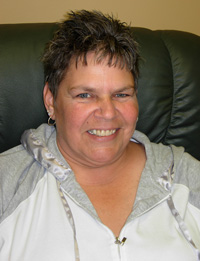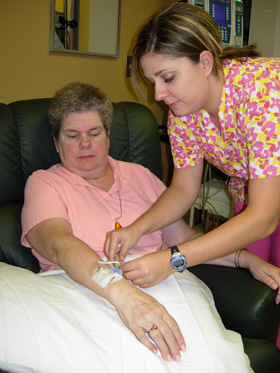 |
Jane Fallon |
She was diagnosed four years ago after seeking answers from her physician about why she was dropping things more frequently. Now she can’t write with her right hand and can hardly walk.
Her disease was under control, but has now relapsed and her treatment choices are few.
Fallon was happy to learn that Tysabri, a drug once taken off the market, is available again. Physicians say a vast majority of patients with MS may benefit.
On June 5, the Food and Drug Administration (FDA) approved the resumed marketing of Tysabri (natalizumab), a monoclonal antibody used for the treatment of patients with relapsing forms of MS. The drug is used as a monotherapy and is meant for patients who have not responded adequately to, or cannot tolerate, other treatments.
Initially approved by the FDA in 2004, it was voluntarily withdrawn by the manufacturer in February 2005 after three patients in the drug’s clinical trials developed progressive multifocal leukoencephalopathy (PML), a serious viral infection of the brain. This past February, the FDA allowed a clinical trial of Tysabri to resume following a reexamination of the patients who had participated in the previous clinical trials, confirming that there were no additional cases of PML.
This past March, the FDA consulted with its Advisory Committee which recommended a risk-minimization program with mandatory patient registration and periodic follow-up to identify as early as possible any cases of PML that do occur and to try to determine the reason the infection occurs.
The drug is hailed for its effectiveness in dramatically reducing the clinical exacerbations, as well as the brain MRI lesions, associated with the disease.
“This is the first drug that was proven to reduce disability in MS,” said Pierre Fayad, M.D., Reynolds Centennial Professor and chairman, UNMC Department of Neurological Sciences. “All the other drugs reduce clinical exacerbations and brain MRI lesions, albeit to lesser degree, but have not been proven to reduce the disability. It is the first drug to show a dramatic reduction in changes in the brain that decrease the lesions up to 90 percent as oppose to 40 to 50 percent with other drugs. Reducing the disease activity on brain imaging by 90 percent is a dramatic change.”
UNMC will be the first of several sites in Nebraska to begin treating patients under the Tysabri Outreach Unified Commitment to Health (TOUCH) prescribing program, including Creighton University and a Lincoln site.
 |
Wendy Scholl administers an infusion of Tysabri to Judy Kastrup, the first patient at UNMC to receive the treatment since the FDA allowed remarketing of the drug. |
The drug, manufactured by Biogen Idec and distributed by Elan Pharmaceuticals, is given every month in a one-hour intravenous infusion, and is only available to patients and prescribing physicians who have registered in the TOUCH prescribing program.
“This is a very effective medication, but it comes at a price,” Dr. Fayad said. “The price is there is a risk for a rare fatal disease to happen in about one out of 1,000 patients.
“It is not for any patient with multiple sclerosis because of its potential side effects. We restrict it to those where we believe the benefit outweighs the risks. The best candidates are people who have serious, progressive and worsening disease and have not responded well to available treatments,” he said.
Patients on Tysabri need to be monitored very closely, Dr .Fayad said. “We worked very hard to meet the safety and monitoring criteria that will allow us to provide this medication to patients who need it,” he said. “We have a commitment to provide the latest and most effective treatments to patients with neurologic diseases.”
Fallon, 48, knows and understands the risks involved with taking the drug. “I’m so excited to start this new treatment,” she said. “I know somewhere down the road I will regain my walking.”
Judy Kastrup, 65, is another patient who’s happy the drug is back on the market. “It’s better than getting a shot everyday,” she said. “I don’t like shots to start with.”
Multiple sclerosis is a disease that affects the central nervous system with specific involvement of the white matter in the brain and spinal cord. General symptoms generally present with attacks that can include weakness, numbness, loss of balance or control over the limbs, vision problems, difficulty swallowing and speaking, and depression. The multiple attacks eventually add up to causing significant neurologic disability.
For more information call 559-7857.